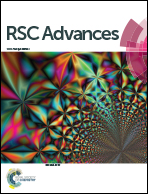Hydrogen production via silica membrane reactor during the methanol steam reforming process: experimental study†
Abstract
The main purpose of this work is to present an experimental operating analysis of a silica membrane reactor (MR) for hydrogen production during the methanol steam reforming (MSR) reaction. To implement this performance analysis, a microporous silica membrane is synthesized by a polymeric sol–gel method. To achieve a high quality silica membrane, a new strategy is used for surface modification of the ceramic support, in which particle size control of the boehmite sol is applied. After evaluation of modified alumina supports, the synthesized silica membrane is characterized and its performance is investigated. The performance analysis of the silica membrane in hydrogen purification shows that the H2/N2, H2/CO2 and H2/Ar permselectivity increase sufficiently to 26.18, 22.13 and 29.42, at 200 °C, respectively, so that hydrogen permeance is measured around 1.1 × 10−6 mol m−2 s Pa at the corresponding conditions. These promising results indicate a high quality of silica membrane for hydrogen production in comparison with the literature data. To achieve the initial purpose of this study, the synthesized silica membrane performance is investigated in the MR set up during the MSR reaction for hydrogen production. In this case, silica MR performance is compared with a traditional reactor (TR) in terms of the methanol conversion, hydrogen yield, hydrogen recovery and CO selectivity. The effects of several operating parameters are also investigated on silica MR performance. In general, the silica membrane presents a higher performance with respect to the TR in all ranges of operating parameters. As a specific consequence, a 6% performance enhancement can be obtained by silica MR in compared to the TR system.


 Please wait while we load your content...
Please wait while we load your content...